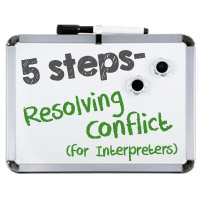Articles tagged as Interpreter 4-1-1
Interpreter 4-1-1: Your Reputation
As a professional interpreter, it is wise to consider your reputation in the community in which you work. Your reputation is formed on a number of important factors. Are you prepared? Are you dressed appropriately? Are you ready to represent the client and profession to the best of your ability? Are you engaged and give back to the community?
Interpreter 4-1-1: Your Interpreter Committee
All of us have heard “little voices” in our head. There may be a voice when you do something you shouldn’t, when you receive praise or when you’re trying to stay motivated. It could be the voice of a parent, a coach, a teacher, a friend, or anyone.
This chorus of voices is sometimes referred to as “The Committee” by interpreters. It represents our minds talking to us while we’re working, playing and living life. Think about what you hear when you’re interpreting. Is your Committee nice? Are they supportive? Do any Committee members have a louder voice than the rest? Here are examples of possible Committee members...
Interpreter 4-1-1: Self-Care is the New Normal
"Self-care" is a popular topic in recent years, and the trend isn’t slowing down. One problem noticed by your authors, however, is that there seem to be competing definitions of this idea and it’s causing a breakdown in the discussion about the importance of self-care. Should self-care be understood as indulgence? Eating a piece of chocolate cake because it’s been a rough day and this will help you to feel better? Or should self-care be thought of as goal-setting?
Interpreter 4-1-1: The Importance of Interpreters Knowing Their Own Comfort Zone
Every human being has biases and the ability to predict events is one of the most valuable you can cultivate as an interpreter. As interpreters we have unique access to the lives of our clients. We need to know ourselves and our hidden biases. What content or situations would you not feel comfortable interpreting? What interpreting situations are deal breakers? What steps could you take when you find yourself in these situations?
Interpreter 4-1-1: 6 Tips for How Interpreters Can Stay Healthy
We as interpreters are notorious for not taking care of our bodies. We see lots of Repetitive Motion Injury among colleagues. We spend a lot of time in our cars. We may develop unhealthy habits (eating fast food or a lack of exercise). In a profession where the primary focus is other people, we need to keep ourselves healthy. Here are 6 tips for how Interpreters can stay healthy...
Interpreter 4-1-1: Ways Interpreters Can Stay Passionate
You will meet interpreters who are burnt out and no longer care about doing their best. Perhaps they are satisfied with their entry level certification. Or they only go to workshops to get their required CEUs. Here are some suggestions to keep that spark that drew you into the Interpreter profession in the first place.
Interpreter 4-1-1: What to Pack in Your Interpreter Bag
Freelance interpreters may find themselves going from a college class in Physics to a hospital emergency room to a theatrical performance all in one day and even when we think we are prepared, "things happen."
The instructor decides to show a non-captioned film and turns out all the lights. The ever-prepared interpreter pulls out their handy dandy flashlight.
Don’t let surprises ruin your day, pack these items in your interpreter bag so you can be prepared for whatever life brings your way...
Buying Guide: What to Pack in Your Interpreter Bag
You’ve probably seen many articles on Signing Savvy by the amazing Brenda Cartwright - she’s a seasoned interpreter, a master teacher, well known presenter, and author of several best selling sign language books. She came up with this great guide of what to pack in your interpreter bag, so when she told us she was giving the keynote address at the Illinois’ Annual Statewide Interpreter Conference, we wanted to show some love to the interpreters by sending a few fully stocked interpreter bags with her for giveaways.
Interpreter 4-1-1: 5 Steps for Resolving Interpreter Conflicts
Interpreting is 99% about being able to work with other people - having good soft skills and good people skills. These aren’t something that everyone is blessed with naturally. It is important to take time to work on and improve these skills.
When have you butted heads with a co-worker? What caused it? Notice I didn’t ask who was at fault or who was to blame. What really caused the conflict? A miscommunication? An age difference? A power difference? Assumptions? How did you resolve the issue? What are some successful strategies?
Here are 5 steps for resolving interpreter conflicts...
Interpreter 4-1-1: Tax Tips for Interpreters
Interpreters often do a lot of freelance / independent contractor work, and receive a Form 1099 at the end of the year to report their compensation. When you are self-employed and do independent contractor work, there are several tax deductions that you can take advantage of. Hopefully you have already been preparing yourself and organizing your taxes. Just in case you need it, here are some helpful hints...
ADVERTISEMENTS

















